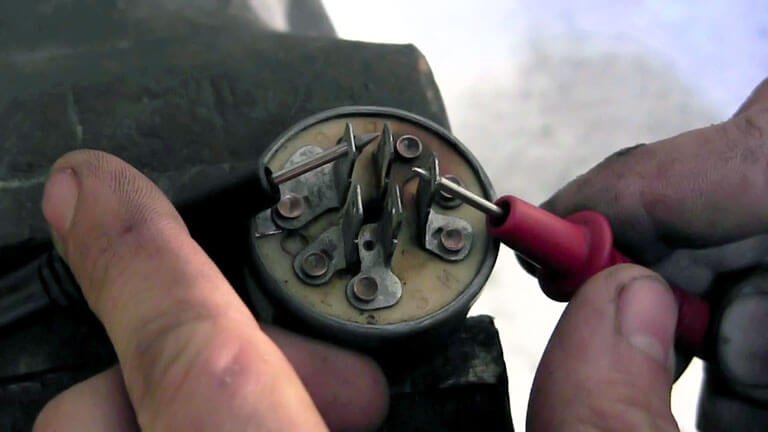Lawn Mower Ignition Switch Problems: Quick Fixes & Tips
Lawn mower ignition switch problems often stem from a faulty switch or poor electrical connections. Check for loose wires or corrosion to diagnose the issue effectively.
A well-functioning ignition switch is crucial for starting your lawn mower. Problems with this component can lead to frustrating situations, especially during the mowing season. Common signs of ignition switch issues include difficulty starting the mower or intermittent power loss.
Understanding how to identify and troubleshoot these problems can save you time and money on repairs. Regular maintenance can prevent ignition switch failures and extend your mower’s lifespan. Learning about the components involved and their functions will empower you to tackle any ignition switch problems confidently. Stay informed and keep your mower in top shape for a lush, healthy lawn.
Introduction To Lawn Mower Ignition Issues

Lawn mowers are essential for maintaining a healthy lawn. An ignition switch problem can disrupt this task. Understanding how to identify these issues is crucial for every mower owner. Ignition problems can lead to frustration and wasted time. Let’s explore the common signs of ignition switch issues.
Common Signs Of Ignition Switch Problems
- Engine won’t start: This is the most obvious sign.
- Intermittent starting: The mower starts sometimes but not always.
- Stalling: The engine may stop unexpectedly while running.
- Clicking sound: A clicking noise often indicates an electrical issue.
- Warning lights: Check for any dashboard warning indicators.
Impact On Lawn Mower Performance
Ignition switch problems can severely affect performance. A faulty switch can lead to:
| Performance Issue | Impact |
|---|---|
| Engine failure | Stops mower from working altogether. |
| Poor fuel efficiency | Increases fuel consumption. |
| Inconsistent power | Causes uneven cutting and longer mowing time. |
| Increased wear | Parts may wear out faster due to stress. |
Addressing ignition issues quickly can restore optimal performance. Regular maintenance helps prevent these problems.
Identifying The Ignition Switch
Understanding the ignition switch is essential for lawn mower maintenance. A faulty ignition switch can prevent your mower from starting. Identifying its location and type helps diagnose issues effectively.
Location And Components
The ignition switch is usually found on the control panel. It connects directly to the battery and starter motor. Here are key components:
- Ignition Key: Turns the mower on and off.
- Wiring Harness: Connects the switch to the electrical system.
- Safety Switch: Prevents accidental starts.
Familiarize yourself with these parts. This knowledge aids in troubleshooting.
Types Of Lawn Mower Ignition Switches
Different lawn mowers use various ignition switches. Below are common types:
| Type | Description |
|---|---|
| Keyed Ignition Switch | Requires a key to start the mower. |
| Toggle Switch | Uses a lever to turn on the engine. |
| Pull Start Ignition | Manual start using a cord. |
Each type has unique features. Recognizing your mower’s switch type is crucial for repairs.
Troubleshooting The Ignition System
Finding issues with your lawn mower’s ignition system can be frustrating. A faulty ignition switch can prevent your mower from starting. This guide helps you troubleshoot effectively.
Initial Inspection Steps
Start with these simple inspection steps:
- Check the battery: Ensure it is charged and connected.
- Inspect the ignition switch: Look for any visible damage.
- Examine wiring: Check for loose or broken wires.
- Look at the fuses: Replace any blown fuses.
- Test the key: Ensure it turns smoothly in the ignition.
Tools Needed For Diagnosis
Gather these tools for effective diagnosis:
| Tool | Purpose |
|---|---|
| Multimeter | Measure voltage and continuity. |
| Screwdriver Set | Tighten or remove screws. |
| Wire Strippers | Repair damaged wires. |
| Fuse Tester | Check fuses for functionality. |
| Flashlight | Illuminate dark areas for inspection. |
These tools will help you identify and fix the ignition issues. Follow the steps carefully to ensure a smooth troubleshooting process.
Quick Fixes For Common Problems
Lawn mower ignition switch problems can disrupt your mowing routine. Simple fixes can save you time and frustration. Here are some quick solutions for common ignition switch issues.
Cleaning The Ignition Switch
A dirty ignition switch can cause starting problems. Dust and debris can block connections. Follow these steps to clean it:
- Turn off the mower and remove the key.
- Locate the ignition switch.
- Use compressed air to blow out dirt.
- Dampen a cloth with contact cleaner.
- Wipe around the switch carefully.
Regular cleaning keeps the ignition switch functional. Check it every few months.
Tightening Loose Connections
Loose connections can lead to ignition issues. Ensure all wires are secure. Here’s how:
- Turn off the mower and remove the key.
- Inspect all wiring near the ignition switch.
- Use a screwdriver to tighten loose screws.
- Check battery connections for tightness.
- Reconnect any wires that appear loose.
Tight connections help maintain a strong electrical flow. Regular checks prevent future problems.
Testing The Ignition Switch
Testing the ignition switch is essential for diagnosing lawn mower issues. A faulty ignition switch can prevent the engine from starting. This guide will help you test it effectively.
Using A Multimeter
A multimeter is a handy tool for testing electrical components. Follow these steps to test your ignition switch:
- Gather your tools: multimeter, screwdriver, and safety gloves.
- Locate the ignition switch on your mower.
- Disconnect the battery to ensure safety.
- Remove the ignition switch from its housing.
- Set your multimeter to the resistance (Ohms) setting.
Now, proceed to test the ignition switch:
- Connect the multimeter probes to the switch terminals.
- Turn the switch to the “On” position.
- Check for continuity. A reading close to zero indicates a good switch.
Interpreting Test Results
Understanding your multimeter readings is crucial. Here’s a simple guide:
| Reading | Meaning |
|---|---|
| 0 Ohms | Good switch; current flows freely. |
| Infinite resistance | Faulty switch; no current flow. |
| Any reading between 1-100 Ohms | Weak connection; consider replacing the switch. |
After interpreting the results, take action based on your findings. Replace the ignition switch if needed. Regular testing can prevent future problems.
Replacing A Faulty Ignition Switch
Replacing a faulty ignition switch can save time and money. A working ignition switch is crucial for starting your lawn mower. Follow these steps for a smooth replacement process.
Step-by-step Replacement Guide
- Gather your tools:
- Screwdriver
- Wrench
- New ignition switch
- Safety gloves
- Disconnect the battery:
This prevents any electrical shock. Always disconnect the negative terminal first.
- Remove the old ignition switch:
Locate the ignition switch on the mower. Unscrew and disconnect the wires.
- Install the new ignition switch:
Connect the wires to the new switch. Ensure they match the old configuration.
- Secure the ignition switch:
Screw the new switch into place. Make sure it is tight and secure.
- Reconnect the battery:
Connect the positive terminal first. Then, connect the negative terminal.
- Test the ignition switch:
Turn the key to start the mower. Ensure it runs smoothly.
Safety Precautions
Safety is vital during this replacement. Follow these precautions:
- Wear safety gloves to protect your hands.
- Work in a well-lit area to see clearly.
- Keep children and pets away from your workspace.
- Ensure the mower is on a flat surface to avoid accidents.
- Double-check all connections before reconnecting the battery.
Preventative Maintenance Tips
Maintaining your lawn mower’s ignition switch is vital. Regular care keeps your mower running smoothly. Here are some effective tips for preventative maintenance.
Regular Cleaning Routines
Keeping your ignition switch clean is essential. Dirt and debris can hinder performance. Follow these cleaning steps:
- Turn off the mower and disconnect the battery.
- Remove the ignition switch cover.
- Use a soft brush to clean debris.
- Wipe all surfaces with a damp cloth.
- Allow it to dry completely before reassembling.
Schedule cleaning every month. This helps to prevent build-up and ensures optimal performance.
Inspection Schedules
Regular inspections are crucial for your mower. Check the ignition switch for signs of wear. Follow this inspection guide:
| Inspection Area | Frequency | Action |
|---|---|---|
| Wires and Connectors | Every 2 weeks | Look for frays or corrosion |
| Switch Functionality | Monthly | Test for smooth operation |
| Battery Connections | Every 3 months | Tighten and clean terminals |
Document your inspection dates. This helps track maintenance and identify patterns.
Staying proactive with these tips ensures your lawn mower runs efficiently. Regular care saves time and money in the long run.
Professional Vs. Diy Repair
Choosing between professional help and DIY repair for lawn mower ignition switch issues can be tough. Understanding the differences can save time and money. Here’s a closer look at both options.
When To Call A Professional
Some problems require expert skills. Here are signs it’s time to call a professional:
- Complex Issues: If the ignition switch won’t turn on.
- Electrical Problems: Frequent blown fuses or wiring issues.
- Safety Concerns: Any signs of smoke or burning smells.
- Warranty Validity: Repairs may void your warranty.
Professionals have the tools and experience. They can diagnose issues quickly. This prevents further damage to your mower.
Resources For Diy Enthusiasts
DIY repairs can be rewarding. Here are some resources to help:
| Resource Type | Description |
|---|---|
| Online Tutorials | Video guides on platforms like YouTube. |
| Forums | Community support on websites like Reddit. |
| Repair Manuals | Manufacturer manuals often available online. |
| Tool Rentals | Local hardware stores offer tool rentals. |
Before starting repairs, gather your tools. Common tools include:
- Screwdriver set
- Wrench set
- Multimeter for testing
- Replacement parts
Take your time and follow guides closely. This ensures a safe and effective repair.
Enhancing Ignition System Longevity
Maintaining your lawn mower’s ignition system is essential for its performance. A well-functioning ignition switch boosts reliability. Proper care can prevent costly repairs and extend lifespan.
Quality Parts And Installation
Using high-quality parts is crucial for your lawn mower. Cheap components often fail quickly. Consider these factors:
- Choose parts from reputable brands.
- Verify compatibility with your model.
- Check for warranty and support.
Proper installation is just as important. Follow these tips:
- Read the installation manual thoroughly.
- Use the right tools for the job.
- Avoid over-tightening screws.
Avoiding Common Mishandling Practices
Many lawn mower issues stem from mishandling. Recognizing these mistakes can save you time and money.
| Mishandling Practice | Impact |
|---|---|
| Ignoring maintenance schedules | Reduces lifespan of components |
| Using incorrect fuel type | Causes ignition failure |
| Neglecting battery care | Leads to ignition problems |
Follow these practices to enhance longevity:
- Regularly inspect the ignition system.
- Keep connections clean and tight.
- Store the mower properly during off-seasons.
Frequently Asked Questions
What Are Common Lawn Mower Ignition Switch Issues?
Common issues include a faulty switch, wiring problems, and corrosion, leading to starting difficulties.
How To Diagnose Ignition Switch Problems?
Check for power at the switch, inspect wires, and test the switch with a multimeter for faults.
Why Won’t My Lawn Mower Start?
Starting issues can arise from a dead battery, bad ignition switch, or fuel problems, requiring thorough checks.
Can I Replace The Ignition Switch Myself?
Yes, replacing the ignition switch is straightforward with basic tools and safety precautions.
How Much Does An Ignition Switch Cost?
An ignition switch typically costs between $15 and $50, depending on the brand and model of the mower. “`
Conclusion
Lawn mower ignition switch issues can disrupt your mowing experience. Identifying the signs early can save time and money. Regular maintenance and prompt repairs are essential. Stay proactive to keep your mower running smoothly. By addressing ignition problems quickly, you ensure a hassle-free lawn care routine all season long.






